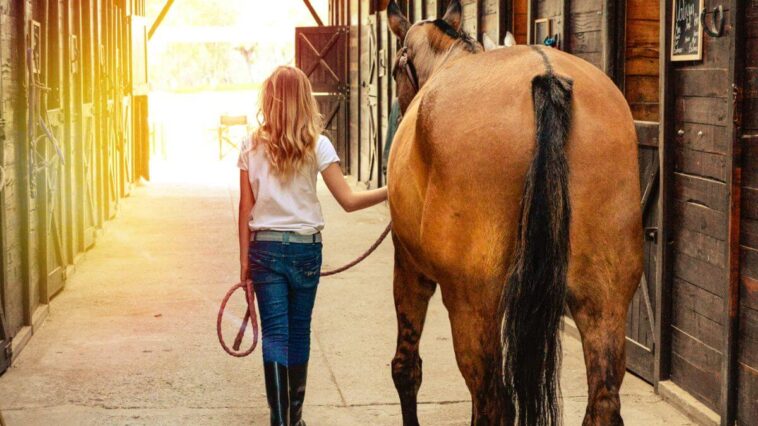Are you curious about how long do horses live and the factors that contribute to a horse’s lifespan? Do you want to ensure your equine companion lives a long and healthy life by your side? Look no further!
In this post, we delve into the secrets of horse longevity, exploring the key elements that can influence their lifespan and well-being. From proper care and nutrition to veterinary attention and environmental considerations, we unravel the essential steps you can take to promote your horse’s longevity.
Get ready to discover expert insights and practical tips that will help your horse thrive for years. Let’s embark on this journey together and unlock the secrets of a long, fulfilling equine life!
How Long Do Horses Live?
The lifespan of horses can vary depending on several factors. On average, horses live for approximately 25 to 30 years. However, this can differ depending on breed, genetics, health care, and living conditions. Certain horse breeds are known for their longevity, with some living well into their 30s or early 40s. Proper care and a healthy lifestyle are essential to maximize a horse’s lifespan.
While genetics contribute to a horse’s lifespan, other factors also play a crucial role. A balanced diet that meets the horse’s nutritional needs, appropriate exercise, and a suitable living environment is vital for longevity. Regular veterinary care, including vaccinations, dental check-ups, and deworming, is essential to ensure the overall health and well-being of the horse. Additionally, prompt attention to any health issues or injuries and addressing them promptly can positively impact a horse’s lifespan.
Despite efforts to provide the best care, some horses may experience health issues or accidents that can shorten their lifespan. Common health concerns in horses include dental problems, joint issues, gastrointestinal disorders, and age-related conditions such as arthritis. Regular monitoring, preventive care, and early intervention can help manage these health issues and potentially extend a horse’s lifespan.
By understanding the factors influencing a horse’s longevity and taking proactive measures to ensure their well-being, horse owners can help their equine companions live long and healthy lives.
Factors That Can Affect a Horse’s Lifespan
Several factors can influence a horse’s lifespan. Here are some detailed factors that can impact how long a horse lives:
Breed: Different horse breeds have varying lifespans. Some breeds are known for longevity, while others may have shorter lifespans. For example, smaller horse breeds like Arabians and Thoroughbreds are often known to live longer than larger draft horse breeds such as Clydesdales or Percherons.
Genetics: Genetics plays a significant role in determining a horse’s lifespan. Some horses may inherit genetic traits that make them more susceptible to certain health conditions or diseases, impacting their longevity. Conversely, horses with strong genetic backgrounds and healthy bloodlines may have a better chance of living longer.
Health care: Regular and proper veterinary care is crucial for a horse’s well-being and lifespan. Routine vaccinations, dental check-ups, deworming, and preventive healthcare measures can help identify and address any health issues before they become serious. Prompt treatment of injuries or illnesses can contribute to a horse’s longevity.
Nutrition: A balanced and nutritious diet is essential for maintaining a horse’s overall health and extending its lifespan. Horses require a diet that meets their nutritional needs, including the right amounts of forage, grains, and supplements. Malnutrition or improper feeding can lead to health problems and a shortened lifespan.
Exercise and activity: Regular and proper physical activity are important for a horse’s musculoskeletal health, cardiovascular system, and overall well-being. Regular movement and exercise help maintain joint flexibility, muscle strength, and mental stimulation, which can contribute to a longer lifespan.
Living conditions: The environment in which a horse lives can also impact its lifespan. A stress-free and low-risk environment helps minimize the chances of accidents or injuries. Horses that are kept in safe and suitable living conditions, with access to clean water, shelter, and adequate space for movement, tend to have better overall health and longevity.
Individual care: Individualized care and attention from responsible horse owners or caretakers can significantly impact a horse’s lifespan. Regular monitoring of a horse’s health, prompt attention to any signs of illness or injury, and proactive measures to maintain overall well-being can contribute to a longer and healthier life.
It’s important to note that while these factors can influence a horse’s lifespan, individual variations exist, and some horses may live longer or shorter lives due to a combination of genetic predispositions and environmental factors.
Breeds with Longer or Shorter Lifespans
Here are some horse breeds that are generally associated with longer or shorter lifespans:
Breeds with longer lifespans:
Arabians: Arabian horses are often known for their longevity. With proper care, Arabians can live well into their 30s or beyond.
Thoroughbreds: Thoroughbreds, primarily bred for horse racing, can also have relatively long lifespans. Many Thoroughbreds live into their late 20s or early 30s.
Morgans: Morgans are a versatile breed known for their hardiness and longevity. They often have lifespans that extend into their 30s.
Andalusians: Andalusians, a breed originating from Spain, are renowned for their elegance and longevity. They can live well into their 30s with proper care.
Breeds with shorter lifespans:
Draft Breeds: Draft horse breeds, such as Clydesdales, Percherons, and Belgians, are larger and have heavier bodies. Due to their size, they often have slightly shorter lifespans compared to smaller horse breeds.
Miniature Horses: Miniature horses are small in stature but tend to have slightly shorter lifespans than their larger counterparts.
Ponies: Ponies come in various sizes and breeds, but they generally have shorter lifespans than full-sized horses. Some pony breeds may have lifespans ranging from 20 to 25 years.
It’s important to note that these are general observations, and individual horses within each breed can have variations in their lifespans. Additionally, proper care, nutrition, and a healthy lifestyle can significantly impact the lifespan of any horse, regardless of the breed.
How to Care for Your Horse to Promote Longevity
Caring for your horse properly can significantly contribute to its longevity. Here are some essential tips for promoting a long and healthy life for your horse:
Regular Veterinary Care: Schedule routine check-ups with a veterinarian to ensure your horse’s overall health. This includes vaccinations, dental examinations, deworming, and annual health evaluations. Early detection and treatment of any health issues can prevent them from becoming serious.
Balanced Nutrition:
- Provide a well-balanced diet that meets your horse’s nutritional needs.
- Feed high-quality forage, such as hay or pasture, and appropriate grains or concentrates.
- Consider consulting with an equine nutritionist to ensure your horse’s diet is suitable for its age, activity level, and any specific health requirements.
Dental Care: Regular dental check-ups and floating (filing down sharp edges or uneven surfaces of the teeth) are crucial for a horse’s oral health. Proper dental care ensures efficient chewing, digestion, and overall well-being.
Exercise and Turnout: Regular exercise is essential for maintaining your horse’s physical fitness and mental well-being. Use appropriate exercise routines, such as riding, lunging, or ground training, to keep your horse active and fit. Provide daily turnout in a safe and spacious environment where your horse can move, socialize, and graze.
Hoof Care: Schedule regular farrier visits to maintain proper hoof health. Routine trimming and shoeing (if necessary) help prevent common hoof problems and ensure proper balance and weight distribution.
Parasite Control: Implement a strategic deworming program based on fecal egg counts and veterinarian recommendations to control internal parasites. Effective parasite control is crucial for your horse’s health and longevity.
Safe Environment: Provide a safe and well-maintained living environment for your horse. Ensure sturdy fencing, remove any hazards or potential sources of injury, and maintain clean and well-ventilated stables or shelters.
Mental Stimulation: Enrich your horse’s life by providing mental stimulation through varied activities, such as trail riding, obstacle courses, or ground exercises. This helps prevent boredom and promotes overall well-being.
Regular Grooming: Regular grooming keeps your horse clean and allows you to inspect its body for any signs of skin issues, wounds, or injuries. Grooming also helps strengthen the bond between you and your horse.
Emotional Care: Horses are social animals and thrive on positive human interaction. Spend quality time with your horse, provide companionship, and establish a trusting relationship. A happy and emotionally content horse is likelier to lead a healthy and fulfilling life.
Each horse is unique, and their care requirements may vary. Consulting with equine professionals, such as veterinarians and trainers, can provide personalized guidance based on your horse’s needs.
Signs of Aging and End-Of-Life Care for Horses
As horses age, they may exhibit certain signs indicating the natural aging process. Horse owners need to be aware of these signs and provide appropriate end-of-life care when the time comes.
Here are some signs of aging in horses and considerations for end-of-life care:
Signs of aging
- Weight Loss: Older horses may experience weight loss despite maintaining a good appetite. This can be due to a decrease in their ability to digest and absorb nutrients efficiently. Make some changes to the diet, like adding supplements or providing feeds that are easier to digest.
- Dental Issues: Aging horses may develop dental problems such as worn teeth, missing teeth, or gum disease. Regular dental check-ups and adjustments can help ensure they can properly chew and digest their food.
- Joint Stiffness and Arthritis: Arthritis is common in aging horses and can cause stiffness, reduced mobility, and lameness. Providing comfortable bedding, regular exercise appropriate for their condition, and considering joint supplements or medications can help manage their comfort levels.
- Reduced Immune Function: Older horses may have a weaker immune system, making them more susceptible to infections and illnesses. Ensuring they receive regular vaccinations, maintaining a clean environment, and monitoring their health closely can help prevent and manage diseases.
- Diminished Sensory Function: Hearing and vision may decline as horses age. Taking extra care of their surroundings, providing well-marked boundaries, and adjusting management practices to accommodate their sensory changes can help prevent accidents and injuries.
- Behavioral Changes: Older horses may exhibit changes in behavior, such as increased irritability, decreased energy levels, or a decreased tolerance for physical exertion. Understanding and adapting to these changes can provide them with a comfortable and stress-free environment.
End-of-Life Care:
When the time comes, providing proper end-of-life care for a horse is crucial to ensure their comfort and dignity. Here are some considerations:
- Consult with a Veterinarian: Work closely with your veterinarian to determine the best course of action based on your horse’s condition. They can guide pain management, palliative care, and euthanasia options when necessary.
- Pain Management: If your horse is experiencing chronic pain or discomfort, work with your veterinarian to develop a pain management plan that may involve medication, supportive therapies, or alternative treatments.
- Comfortable Environment: Create a peaceful and comfortable environment for your horse during its final days. Ensure access to fresh water, clean bedding, and a quiet space where they can rest undisturbed.
- Emotional Support: Spend quality time with your horse, providing reassurance and companionship during this challenging time. Your presence can offer comfort and support to both you and your horse.
- Euthanasia: If euthanasia becomes the most compassionate option, work with your veterinarian to ensure it is performed humanely. They will guide you through the process and help minimize any pain or distress for your horse.
End-of-life decisions are never easy, but prioritizing your horse’s well-being and comfort is crucial. Discuss your concerns and questions with a veterinarian to make informed decisions and provide the best possible care during this stage of your horse’s life.
Frequently Asked Questions
- Can the lifespan of a horse be extended with proper care?
Yes, proper care, including regular veterinary check-ups, balanced nutrition, and a safe environment, can extend a horse’s lifespan.
- Do horses live longer in the wild or captivity?
Horses in captivity generally live longer due to access to veterinary care, protection from predators, and shelter from harsh weather conditions.
- Are there factors that can shorten a horse’s lifespan?
Neglect, inadequate care, poor nutrition, lack of veterinary attention, accidents, injuries, and underlying health issues can shorten a horse’s lifespan.
- Are there horse breeds known for exceptionally long lifespans?
While no specific breeds are universally known for exceptionally long lifespans, certain breeds like Arabians, Thoroughbreds, Morgans, and Andalusians are often associated with longer lifespans.
Conclusion
Various factors, including proper care, nutrition, veterinary attention, and living conditions, can influence the lifespan of a horse. Providing attentive care and addressing your horse’s specific needs can contribute to a longer and healthier life.
While horses in captivity generally live longer due to access to care and protection, each horse is unique, and individual circumstances can impact lifespan.
It’s essential to proactively manage their health, seek professional guidance when needed, and ensure a safe and suitable environment. By doing so, you can help promote the longevity and well-being of your horse.




